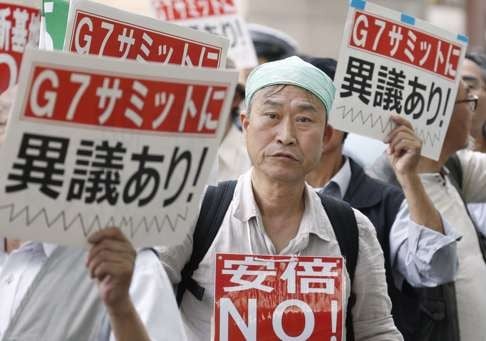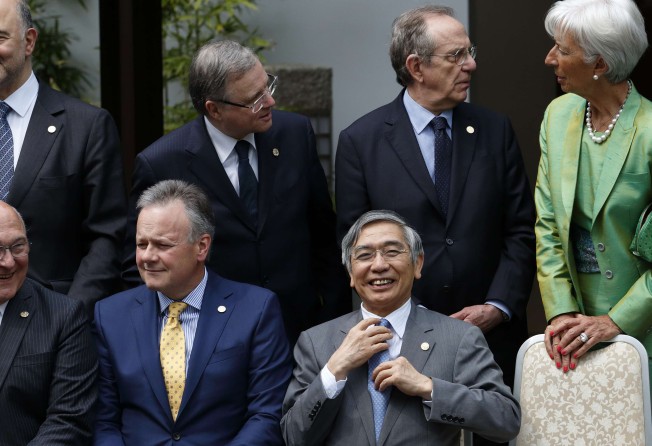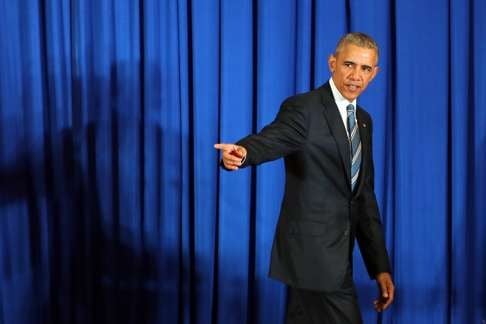
Amid rising nationalism, the G7 is in desperate need of a global mindset
Kevin Rafferty says the clubby grouping, which notably excludes China and India, could do with a shake-up at its upcoming meeting, and Barack Obama is best placed to drive change

So-called leaders of the so-called “free world” are getting ready again to waste millions of dollars of taxpayers’ hard-earned money, not to speak of disrupting traffic and posing security problems for ordinary people, in yet another of their circus shows demonstrating their incompetence.
It is time for the annual get-together of the Group of Seven, this year in Ise-Shima, Japan. The only hope is that US President Barack Obama will make one final effort to leave a legacy, not to save the world (a faint dream) but to see that the G7 has some semblance of world vision before his own country tears apart the global architecture, with devastating consequences.
Last weekend, we witnessed a shabby rehearsal for the summit: finance ministers and central bank chiefs agreed on the need to promote growth but could not agree on how or who should take a lead. They did not even bother to issue a formal communiqué. In a pathetic demonstration of narrow nationalistic views increasingly dominating these meetings, host minister Taro Aso was most concerned to get a free hand to weaken the yen, Japan’s mistaken policy of promoting growth via pandering to its big exporting corporations. US Treasury Secretary Jack Lew slapped him down.

Finance chiefs are trapped by the unprecedented economic circumstances where throwing trillions of dollars of quantitative easing has failed to boost growth, and by the failures of their political leaders who lack both imagination and guts. The underlying problem is that we live in an increasingly globalising world, but few political leaders understand or care about issues beyond their own backyard.
Right across Europe, populists and nationalists are rising as if they have all had lobotomies to erase the bloody memories of wars from their consciousness.
In the US, the demagogic rise of Donald Trump threatens so many of the limited global achievements, including trade openness and baby steps to repair the fragile environment.
Let’s not kid ourselves that the angels have fled to Asia. One reason why the meeting is being held in Mie prefecture is that it is the home of the sacred Ise Shinto shrine. Prime Minister Shinzo Abe hopes the G7 summit will promote his upper house election campaign and his plans to change the constitution, conveniently forgetting that the nationalist brand of Shintoism he espouses was a dangerous 19th-century hijack of an old-time religion, and ultimately cost Japan dearly.
Closer to home, both China and India are pursuing nationalist agendas. President Xi Jinping (習近平) is a sibling of Trump, though smarter, not boasting, but remorselessly pressing ahead to achieve his agenda of wiping out centuries of insults to imperial China.
Can anyone reroute the perilous path leaders are taking? A few years ago, Angela Merkel was a global leader, but her generosity over refugees has made her vulnerable to nationalist clamours in Germany.
The European Union suffers from multiple grave crises, and issues of Brexit, and indeed the future of the EU as a whole, will not be settled by the UK vote on June 23, whichever way it goes.

And there is the US. Respected commentators claim Trump could win, predicting that he will tear apart Hillary Clinton with his unorthodox attacks while being invulnerable to her conventional political challenges. Whoever wins, the populist campaigns of Trump and Bernie Sanders are likely to diminish the global imagination and generosity of America.
Obama should belatedly try to earn his Nobel Peace Prize
Obama has some room for manoeuvre because he is not beholden to popular domestic pressures. He should belatedly try to earn his Nobel Peace Prize. Let him demand that China and India immediately join the G7: their exclusion, the most populous countries in the world and two of its largest economies, makes a mockery of any claims to world leadership by the G7.
Let him use his Hiroshima visit to go beyond the campaign against nuclear disarmament and lay out an agenda for global peace. Whether we are Africans, Americans, Chinese, Europeans, Indians or Japanese, we owe allegiance to our home countries but we have a global responsibility, too, which short-sighted nationalist leaders should be reminded of.
Kevin Rafferty, journalist and commentator, was a World Bank official and professor at Osaka University